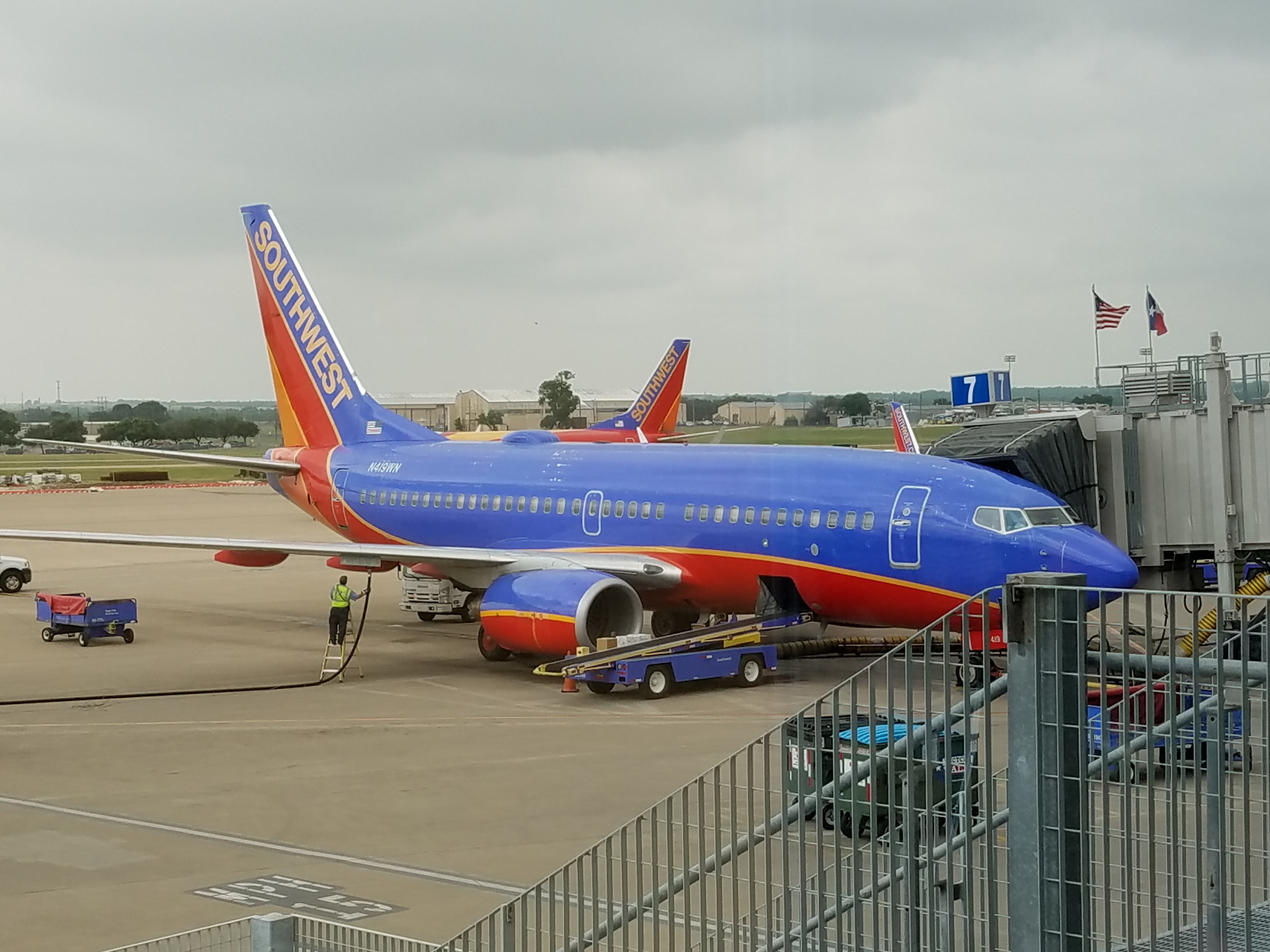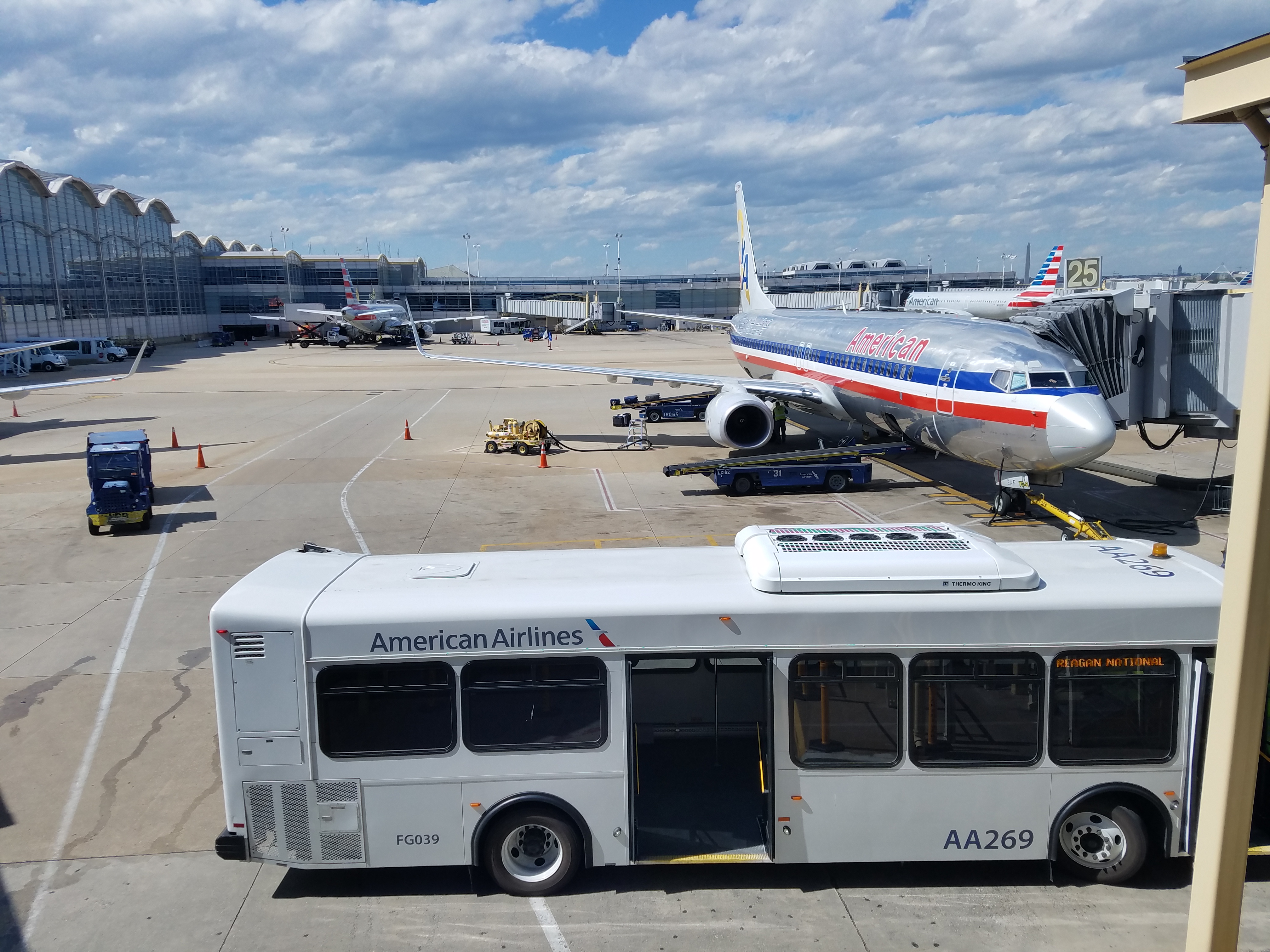Southwest Airlines doesn’t charge for checked bags, doesn’t charge change fees, doesn’t charge for carry on bags either.
It also carries more domestic passengers than any other airline. Its stock has the highest price-earnings multiple of US airlines.
While the past two months have been rough for airline stocks broadly, as Southwest’s major airline competitors actively make the travel experience worse with less legrooms and more restrictive fares, Southwest’s stock is also the only one that’s up year to date.

United says their new restrictive Basic Economy fares are costing them business. They think the bleeding will stop though since they can count on American to play the greater fool and stop offering more value on competing routes once they too roll out Basic Economy fares across their route network this month.
Southwest along with Alaska and JetBlue continue to offer greater value to customers at the same price as United and American. United and American have internalized that the key to success is copying their competitors and avoiding providing customers with more value at all costs.

While conventional wisdom is that the markets are pushing United and American in this direction, the markets are relatively rewarding Southwest for its business model and punishing American and United for theirs.
United hadn’t planned to offer such a restrictive Basic Economy product, by the way, when new President Scott Kirby delayed its launch to make it more like the draconian American Airlines product he had planned when he was President of that airline. He’s re-banking United’s hubs like he did at American too. And he plans to add more seats to United’s aircraft the way he did at American.
In some sense the market is judging the long-term value of Southwest Airlines versus Scott Kirby. At a minimum the facts on the ground ought to challenge the wisdom that an airline can enhance its value by trying to charge customers more while providing them with less.


Southwest also explodes the myth that a unionized workforce harms competitiveness and lowers profits.
@john – I have written about this, unionization alone isn’t the driver eg http://viewfromthewing.com/2017/05/14/start-turning-around-bad-service-us-airlines/
Although it still represents a risk to Southwest http://viewfromthewing.com/2017/07/22/southwest-airlines-destroying-culture-firing-many-people/
I think your thesis is very weak. Southwest has always had a higher valuation than its competitors. I don’t think it’s because they treat their customers better. Honestly, I don’t think Wall Street cares if customers are happy. It cares that the company is profitable, which Southwest has consistently been for decades.
At various times, the market has rewarded airlines that treat their customers poorly. Spirit is a great example. The market didn’t care that Spirit customers were unhappy. They cared that Spirit made money, and seemed poised to make more money.
The market is now unhappy at Spirit even though, objectively, it’s treating its customers better (new CEO). The reason it’s unhappy is that the legacy carriers are now effectively fighting Spirit’s expansion with their Basic Economy fares. This means that Spirit’s future is less bright, so the stock is worth less.
I know you WANT to believe that airlines should be incentivized to provide good customer service, but I think the reality is that profitability is WAY more important than good customer service. Many airlines with good customer service have gone out of business. I do think that good service can be a worthwhile strategy for profitability, but it’s not the only strategy. In Europe, Ryanair has done extremely well by NOT treating its customers particularly well (stock has more than tripled in past 5 years), while its competitors have drowned with much better service.
Look at two 5 year charts
Too bad AAL and UAL decided to follow DAL instead of LUV.
(LUV vs AAL vs UAL)
https://www.google.com/finance?chdnp=1&chdd=1&chds=1&chdv=1&chvs=maximized&chdeh=0&chfdeh=0&chdet=1504641600000&chddm=507127&chls=IntervalBasedLine&cmpto=NASDAQ:AAL;NYSE:LUV&cmptdms=0;0&q=NYSE:UAL&ntsp=0&ei=PruuWfmxDMKAmAGev4e4CA
(DAL vs AAL vs UAL)
https://www.google.com/finance?chdnp=1&chdd=1&chds=1&chdv=1&chvs=maximized&chdeh=0&chfdeh=0&chdet=1504641600000&chddm=507127&chls=IntervalBasedLine&cmpto=NASDAQ:AAL;NYSE:DAL&cmptdms=0;0&q=NYSE:UAL&ntsp=0&ei=PruuWfmxDMKAmAGev4e4CA
With regard to unionization, I’m 100% certain that Southwest would be a more profitable and successful company WITHOUT unionization. Unionization has led to exploding wage costs at Southwest, and higher fares. This has enabled its legacy competitors to better compete against Southwest, and opened the door to a new breed of low cost competitors, like Spirit and Frontier. I think Southwest CEO Gary Kelly has done a good job managing this transition to higher costs, but Southwest is no longer the industry wunderkind it once was. American, Delta and United no longer fear it. And that’s largely because of unionization and high wage costs.
@iahphx “I don’t think it’s because they treat their customers better. … It cares that the company is profitable, which Southwest has consistently been for decades.”
Why do you think that is?
At a minimum, it certainly *isn’t* pursuing a strategy of making customers unhappy.
Good service does equal long term profits. I have been voting with my dollars and avoiding AA and UA. I look at schedules for Alaska, Jet Blue, and Southwest in that order for domestic. Internationally I have started using foreign carriers.
@Gary Leff – What about the rock hard slim line seats, and revenuization of the loyalty program.
They led the charge on some of the trends being reviled when adopted by other airlines.
@Greg – I don’t like the frequent flyer program, but go use an American AAdvantage mile, I’m not sure I prefer accruing those over Rapid Reeards at this point and for valuable points look to Chase and Amex. You have the rock hard seats on American and United, and Southwest’s stage lengths are at least shorter.
I think Southwest’s relatively high wage structure is due to the fact that, for decades, it has been profitable every single quarter and its workforce has been the most productive (even while being unionized of course). While it is impossible to tell how management would have compensated employees in the absence of a union, I don’t believe that Southwest’s wage structure is higher because of the unions. Joining a union is no guarantee of higher pay.
Over the same period, most of Southwest’s competition (also unionized overwhelmingly) has been losing money hand over fist and either folded or gone through one or more bankruptcies where wages, benefits and work rules were gutted. By all rights, Southwest employees should have the highest pay as their employer has been by far the most successful company financially thanks to a successful business model and a committed and engaged (unionized) workforce. Southwest executives should also be the highest paid, though something tells me that’s probably not the case.
Unionization is certainly no guarantor of financial success or even employment security. But to assert that unionization must always lead to poorer financial performance is false.
You discovered the wheel. Yes, profitability is tied to customer satisfaction (in all but monopolies). An avalanche of studies has supported this for decades, to the point where in the management consulting world they consider it a “law” (Bain & Co. was one of the first consultants to make money off of this proven relationship).
“Southwest Airlines doesn’t charge for checked bags, doesn’t charge change fees, doesn’t charge for carry on bags either.”
Nonsense. Someone has to pay for my heavy checked bags.
On Southwest it’s you (quick shout-out to thank you). On Ryanair it’s me.
Southwest is a remarkable company, love ’em. But even the great Herb Kelleher found that magic didn’t come to his rescue when he asked it to make the cost of carrying baggage free.
@Jake — OK, then explain Ryanair.
@ Gary — Honestly, I think WN’s early success was largely the result of the ossified nature of its regulation-era competition at the time. Once a new generation of executives “fixed” the legacy carrier business model, WN became (comparatively) less successful. For example, while WN carries the most domestic passengers of any airline, it only made half the profits that Delta did last quarter. Most people don’t realize this; just like they still think WN has “low fares.” It takes awhile for new realities to sink in.